25 Aug 2023
Demand for tougher penalties to address “growing trend” of canine cropping, as latest data shows 1,200 alleged cases of mutilation have been reported to RSPCA in past three years.

Image: © RSPCA / Cancel Out Cruelty campaign
Tighter rules and tougher penalties are needed to address the “growing trend” of canine ear cropping in the UK, veterinary and welfare groups say.
The warning follows the release of new RSPCA data, which shows nearly 1,200 alleged cases of the mutilation have been reported to the organisation over the past three years.
Defra has declined to set out any specific plans to tackle the problem, though it maintains it is committed to acting on it and other issues that would have been covered by the former Kept Animals Bill.
But critics fear the practice could become “normalised” and said ministers must prioritise the issue when they return to Westminster next month, following the summer recess.
BVA senior vice-president Justine Shotton said: “The Government must urgently step up and introduce long overdue measures to close the legal loopholes that are enabling the growing trend for ear-cropped dogs in the UK.”
The RSPCA figures, which were released as part of its summer Cancel Out Cruelty campaign, showed it had received 1,191 reports of ear cropping across England and Wales in the period since 2020.
Dr Shotton said the figures were “extremely concerning” and highlighted the need for the issue to be made a priority.
Meanwhile, separate data from the Scottish SPCA revealed it had received 117 similar reports during 2021-22. Seven of those cases were subsequently put before the Procurator Fiscal, the Scottish equivalent of the Crown Prosecution Service.
The act of ear cropping is itself already illegal in each individual UK country and can be punished through both prison sentences and lengthy bans from keeping animals.
Legislation that came into force two years ago also increased the maximum penalty for animal cruelty offences from six months to five years in jail.
But the Scottish SPCA believes people who crop dogs’ ears themselves, or allow others to do so, should be the subject of lifetime bans from either owning or working with dogs.
The group claims its enquiries have also revealed a link between the practice and organised crime – particularly in relation to American bullies.
Meanwhile, senior RSPCA figures argue the current lack of restrictions on imports can make it harder for their officers to prove that cropping has taken place here, and warned the process is also being heavily promoted on social media.
Analysis in PDSA’s Animal Wellbeing Report, published earlier this year, also estimated that up to 29,000 dogs had been imported to the UK specifically because their ears had been cropped.
The import loophole is an area where action was planned under the Kept Animals Bill, which was formally axed in June after months of uncertainty over its fate and criticism of ministers for failing to bring it back before members.
Since then, Defra officials and ministers have repeatedly insisted that measures from the bill will be brought forward individually during the remainder of the current Parliament.
Those assurances include the department’s formal response to an online petition signed by more than 16,000 people that demanded the bill’s reinstatement.
But, so far, there has been no indication of any imminent steps on cropping, including in response to the RSPCA figures.
Asked by Vet Times what specific plans there were to outlaw the importation of dogs with cropped ears, a department spokesperson said: “We are proud to have some of the highest animal welfare standards in the world – with the practice of cropping dogs’ ears being rightly banned in the UK for the last 15 years.
“We are committed to delivering the Kept Animals Bill measures individually and will be setting out next steps in due course.”
But RSPCA pet welfare expert Samantha Gaines said: “We are concerned that it is a growing fashion trend and it needs to be stopped.”
The charity is urging its supporters to lobby their MPs on the issue, as part of the Mutilated for Money campaign it launched in conjunction with the Welsh charity, Hope Rescue, last month. More information can be found on the website.
Ian Muttitt, a chief inspector in the RSPCA’s special operations unit that investigates cropping cases, said: “We have seen dogs who have suffered because of the after-effects of this cruel procedure.
“They are at a high risk of infection and discomfort – what’s trendy or fashionable about that? Absolutely nothing.
“We are highlighting this horrific practice to help fund investigations into these awful cases while also campaigning to end ear cropping for good.”
The BVA is also encouraging its members to take action in support of its #CutTheCrop initiative by lobbying retailers who sell cropping or splinting kits, and calling out celebrities who post pictures of their cropped dogs online.
Further details are available via the #CutTheCrop webpage.